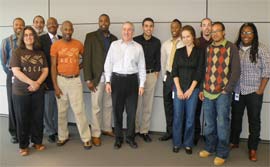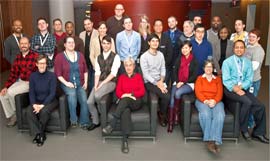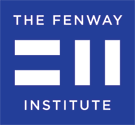 |
previous page | next page | |||||||||||
 |
|||||||||||||
|
|||||||||||||
The Fenway Institute is one of three domestic sites studying the safety and effectiveness of using antiviral medications in HIV-uninfected people to prevent transmission, known as pre-exposure prophylaxis or PrEP. Fenway is part of the first study being conducted among men who have sex with men (MSM) globally, with sites in South America, Africa, Asia and the United States. PrEP is one of the most promising new HIV prevention interventions that may one day supplement more traditional prevention tools, such as condom usage and behavioral change. During fiscal year 2009, The Fenway Institute was the first site activated as part of a national six city study designed to address high rates of HIV infection among Black MSM, who currently have the highest rates of HIV acquisition among any ethnic and racial group of MSM in the United States. Project S.O.S. (Saving OurSelves) is a collaboration between The Fenway Institute and the Multicultural AIDS Coalition and will evaluate the effectiveness of a variety of prevention interventions among four hundred Black MSM from the greater Boston area.
During fiscal year 2009, The Fenway Institute published over 50 peer-reviewed articles, textbook chapters and abstracts for national and international conferences based on its research work. The Fenway Institute is the first community-based organization ever awarded a population-research infrastructure grant by the National Institutes of Health. The Center for Population Research in LGBT Health plays a key role in setting the national agenda for LGBT health and is training the next generation of LGBT health scholars. In 2009, faculty and staff from The Fenway Institute worked closely with other members of the National Coalition for LGBT Health to lobby the federal government to include LGBT people in Healthy People 2020, the federal government’s blueprint for public health policy and spending for 2010 through 2020.
|
The Fenway Institute’s education and training programs continue to grow.
Fenway’s Navigation Project uses Peer Health Navigators to reach those at highest risk for health disparities and connect them to life-saving services. Navigation clients include gay and bisexual men, transgender individuals, those affected by crystal methamphetamine use and other people living within a social blind-spot.
The National LGBT Tobacco Control Network, a project of The Fenway Institute, held its 6th annual LGBTQ (lesbian, gay, bisexual, transgender and queer) Tobacco Summit in Kansas City Missouri. There were double the number of participants from last year, with 137 attendees representing 34 states. We awarded 45 scholarships to the Summit, 31 to adults and 14 to youth. Not only did the event grow in terms of attendees, but it also grew in length to a day and a half; in number of workshops offered to 44, including youth-specific activities and workshops; and in terms of materials and resources offered to participants.
|
||||||||||||
|
20100427V.4 |
|||||||||||||



